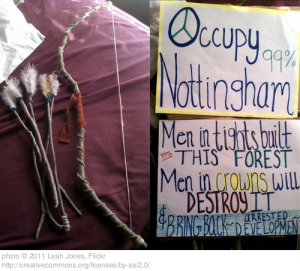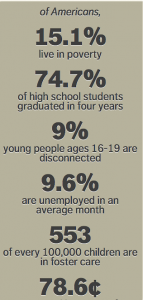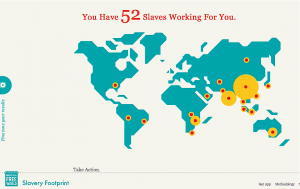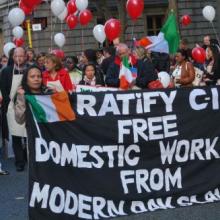Labor
North America is home to an estimated 1.5 million trafficked persons alone. Many of these people are domestic workers—an industry with a growing worth of $8 billion in profits every year.
Many domestic workers in the United States are hard working people who enjoy their jobs and have fair working conditions. But the private and unregulated nature of the job does make these workers vulnerable to exploitation and sometimes a destination job for trafficked women.
This is the problem that authorities grapple with: how to regulate a global industry where workers are so open to exploitation and abuse.
Enter Convention 189—a document that creates international law preventing the trafficking and exploitation of domestic workers like Erwiana. This new international law deals with much of the complexity of the problem while still allowing domestic workers to earn a fair living and bargain for their conditions.
National governments have begun to sign on to Convention 189, but the U.S. and other larger countries are lagging behind in its support for tougher global protections for domestic workers.
For many, these new global protections can’t come fast enough. We know that the more countries like the U.S. sign onto Convention 189, the more robust the law will be and the better the protection for domestic workers.
Occasionally our governments need reminding that the plight of some of the most vulnerable must become a priority. Join me in calling on the United States to support global protections for domestic workers by ratifying Convention 189.
A theology of labor involves Genesis 2:15 – “The Lord God took the man and put him in the garden of Eden to till it and keep it.”
Labor is fundamentally a good thing and a theology of labor includes responsible stewardship of the earth’s resources. The first chapter of Genesis is obsessed with telling us that the world is good. As such, God calls us to labor for it, to responsibly keep and care for it.
Of course, labor often involves hard, back breaking work that doesn’t always feel good. Genesis 3 puts forth an explanation that God cursed the earth because of human sin, making labor much more difficult. Whatever we think about that explanation, the Bible is much more interested in a different curse when it comes to labor — how we humans curse one another.
Like everything in this good world, the goodness of labor can be exploited. The prime biblical example of this comes from Exodus, which describes how the Hebrews were exploited as slaves in Egypt.
They were forced to labor.
Mary Priniski wrote in the August 2013 Sojourners magazine about churches responding in solidarity with garment workers, disproportionately women, after the terrible fires in Bangladesh’s garment factories. Now, a global church alliance has been established. Ekklesia reports:
[The alliance] provides an action plan for grassroots campaigning, and a letter for consumers to send to their retailers demanding improvements to the pay and working conditions of garment workers. Real-life stories from garment workers in Bangladesh also highlight the oppression they face and the struggle to survive.
EVERY TIME I fly into Ontario, Calif., I see neat blocks of gleaming, low-rise warehouses surrounded by well-manicured trees and shrubbery. I now know that what goes on inside those buildings is not nearly so pretty.
As a board member of People of Faith United for Worker Justice, a local faith-rooted worker justice organization, I have seen the dismal working conditions inside several of these warehouses and have heard the testimonies of workers who have been seriously injured on the job. Eighty-five percent of the warehouse workers in Southern California earn minimum wage and receive no health benefits, even though their jobs entail unloading and reloading heavy boxes.
Since many of these workers are hired through temp agencies, which are often located inside the warehouses, workers’ rights are routinely abused. When someone is injured, instead of being cared for, he or she is simply not called back to work the next day. When workers complain about poor working conditions—such as a lack of breaks, access to bathrooms, or having to lift heavy boxes into freight trucks in 108-degree temperatures—the managers tell them it’s not their responsibility because the workers are employed by the temp agency. The temp agencies in turn claim they are not responsible for conditions in the warehouses because the agencies are separate companies.
Editor's Note: The following is the text of an invocation being given at the May Day Rally in Madison, Wis.
When we gather at a place like our State Capitol, there are people here from all sorts of religious and non-religious backgrounds.
There are Christians and Jews, Muslims and Buddhists, Hindus and and Bahai, Humanists and people who are pretty sure they believe something, but don’t know exactly how the heck to describe it.
What connects us all this day is a spirit of hospitality, a spirit of compassion and a spirit of justice.
At their worst, religious and other beliefs can isolate us in little camps where we see outsiders as threats. At their best, they call us to hospitality, not only to those we know, but to the strangers in our midst – those who come from other places, speak other languages, seek a new life. At their best, they call us to embrace those who seek to be part of our community.
BREAKTHROUGHS ON immigration reform will make life easier for some Latino immigrants, but in the sweltering, often-toxic fields where farm workers toil each summer from Maine to California, conditions can still be dehumanizing and dangerous. There is a silver lining, however. With the burgeoning growth of the nation's Latino population, there are more advocates than ever working to improve the plight of the men, women, and often children who do hard labor on our nation's farms.
With a mostly young, deeply committed staff, the Florida-based Coalition of Immokalee Workers (CIW) is doing solid grassroots work to make life better for workers in the state's tomato industry. With cooperation from 11 food retail and food service corporations, CIW has implemented the Campaign for Fair Food, which has brought modest wage increases, worker protections, and grievance procedures to farms that produce 90 percent of the state's tomato crop.
Using a worker-led administrative structure and significant public pressure, CIW has brought companies such as McDonald's, Burger King, Pizza Hut, and KFC into its program that asks corporate partners to kick in an extra penny per pound for the tomatoes they buy. That premium is passed on to growers to increase worker pay.
Elbin Perez, 23, a farm worker from Guatemala, has been working in the U.S. for six years, sending part of his wages back home to his parents and five siblings. As a CIW member, Perez leads "worker-to-worker education programs." Those trainings educate workers about CIW's code of conduct, which growers have agreed to uphold. Reforms include use of time clocks, guaranteed minimum wage, and water and shade breaks.
“We firmly oppose organized efforts, such as those regrettably now seen in this country, to break existing unions and prevent workers for organizing.”
My brother bishops and I wrote that more than a quarter-century ago in our 1986 letter Economic Justice for All. Regrettably, it rings true still today.
The right-to-work legislation that was passed by the House and the Senate in Michigan just this month is designed to break unions. It is designed to prevent workers from organizing. And we must oppose it as firmly as we did during the 1980s.
Today is May Day – an historic day of protest and action for the working class. This year, in light of the Occupy movement, many are hopeful of the resurgence this day can bring in the fight for national against economic injustice.

With the opening of the G20 Summit in Cannes, France today, an idea that's been around for awhile is in the news again and gaining more attention as a result of the #OWS movement: The so-called "Robin Hood tax," a minimal tax on all financial transactions with the resulting revenue dedicated to anti-poverty programs....Archbishop of Canterbury Rowan Williams, in his response to the occupation of St. Paul's Cathedral in London, endorsed the Vatican proposals. Williams observed that "people are frustrated beyond measure at what they see as the disastrous effects of global capitalism," and urged a full debate on "a Financial Transaction Tax

Perhaps the most important finding from the report is that we have both the experience and the policy tools necessary to cut poverty in half.
Between 1964 and 1973, under both Democratic and Republican administrations, the U.S. poverty rate fell by nearly half (43 percent) as a strong economy and effective public policy initiatives expanded the middle class.
Similarly, between 1993 and 2000, shared economic growth combined with policy interventions such as an enhanced earned income tax credit and minimum wage increase worked together to cut child poverty from 23 percent to 16 percent.
We can't do this alone.
On Nov. 5 folks all over the world will divest from Wall Street and its banks … in order to invest in a better world.
Ideologies alone are not enough. There came a point in the movement to abolish slavery where ideology required responsibility. As one abolitionist said, “The only way to be a good slave-owner is to refuse to be a slave-owner.” To truly be against slavery also meant that you didn’t drink sugar in your tea, because sugar was produced with slave labor.
So on November 5, my wife and I will be joining the “Move Your Money” celebration, moving our money from Bank of America to the non-profit credit union here in Philadelphia.
It is one small step away from the vicious cycle that continues to see money transfer from the increasingly poor to the increasingly rich.
It is trying to take to heart Jesus’ command to “Get the log out” of my own eye.
It is a move towards Gandhi’s call to “Be the change you want to see in the world.”
It’s one little step towards being less of a hypocrite tomorrow than I am today.
(+Video may contain coarse language+)
Indie music darling, Jeff Mangum, who rarely plays in public, surprised #OccupyWallStreet protesters in New York City earlier this week with an impromptu concert. A New Jersey singer-songwriter pens two songs for revolutions. And an order of Catholic nuns offer free mp3 downloads of a protest song inspired by the life of St. Francis of Assisi.
[caption id="attachment_34028" align="alignleft" width="214" caption="Detail of a sculpture at the site of a former slave market, Christ Church, Zanzibar. By Cathleen Falsani."][/caption]
 The Slavery Footprint campaign launched Thursday (Sept. 22), which also happened to have been the 149th anniversary of the Emancipation Proclamation, with the goal of personalizing "the issue of modern slavery by providing people with an assessment of just how much their lifestyle depends on forced labor -- and the steps they can immediately take to help end it."
The Slavery Footprint campaign launched Thursday (Sept. 22), which also happened to have been the 149th anniversary of the Emancipation Proclamation, with the goal of personalizing "the issue of modern slavery by providing people with an assessment of just how much their lifestyle depends on forced labor -- and the steps they can immediately take to help end it."
By following this LINK I was able to plug in some basic information about myself and my lifestyle -- where do I live, do I own or rent, how many children do I have, have many diamonds/leather shoes/electronic gizmos do I own, what are my eating habits, what's in my medicine cabinet, etc., -- and in just a few minutes received the upsetting news that, according to the Slavery Footprint campaigns diagnostics, 52 slaves "work for me."
There are no whirring helicopters, law enforcement vehicles, or hundreds of federal agents swooping down on businesses as in days of old. Instead, such immigration raids have been replaced by a less overtly brutal approach: "silent" raids, or audits of work eligibility I-9 forms.
But the fear remains.
At the first whisper of an employer receiving notice from U.S. Immigration and Customs Enforcement (ICE) that employees' eligibility records are about to be checked, pulses rise. Legal workers worry about being erroneously bounced out of work; unauthorized employees fear being kicked out of the country and separated from their families. Communities are shaken, business operations are disrupted, and jobs are lost. The anemic economy takes another hit.
When it comes to homeless youth the facts are simple, services in the City of Chicago are falling far behind the need. A survey of Chicago public school students from 2009/10 revealed 3,682 children who identified as being homeless and in need of shelter. In contrast there are approximately 189 beds for homeless youth (ages 18-25) funded by the City of Chicago. In 2010, 4,775 homeless youth were turned away from youth shelters for lack of room. To be clear, that was 4,775 instances where homeless youth sought shelter and were unable to find it. To date there are only 10 percent of the beds needed to provide safe shelter and supportive programs for the estimated number of Chicago's homeless youth.
So let me suggest that this Labor Day, the church cannot afford to perpetuate the labor movement as an unexamined challenge in our society. Debates about the role of unions are everywhere, and demand thoughtful theological discussion, consideration, and action.
This Labor Day weekend, we are challenging every congregation and faith community in Ohio and around the nation to devote a portion of your worship service to exploring a biblically informed perspective on labor. This could include part of a homily, a testimony, a time of prayer for labor members in your parish, church, or faith community, or hosting a special conversation or panel on issues of faith and labor.
There's something special about the bookends of our lifetimes. I became a first-time father seven months ago and a hospice chaplain just one month past. Growing up and growing old, especially the first and last months of our lives, can be surprisingly similar experiences.
I fed my daughter sweet potatoes for the first time last night. Introducing her to solid foods has been a treat. While we're trying our best to teach her the sign language words for "food", "more", and " all done", Robin still finds closed-mouth grumble-whines to be the best way to let us know she thinks sweet potatoes aren't all that hot. Another subtly nuanced whine might instead wonder, "You don't happen to have any more mashed banana or applesauce around, would you?" My attempt to turn the filled spoon into an acrobatic and roaring airplane met with scant success.
[Editors' note: As part of Sojourners' campaign to end the war in Afghanistan, we will run a weekly Afghanistan news digest to educate our readers about the latest news and developments related to the war, the U.S. military's strategy, and the people impacted by our decisions. Read more about our campaign at www.sojo.net/afghanistan.]
- Afghan president's half brother killed by a bodyguard: "President Hamid Karzai's half brother, the most powerful man in southern Afghanistan and a lightning rod for criticism of corruption in the government, was assassinated Tuesday by a close associate."






